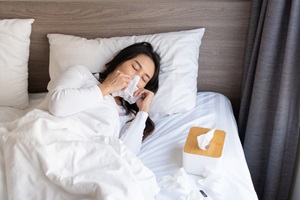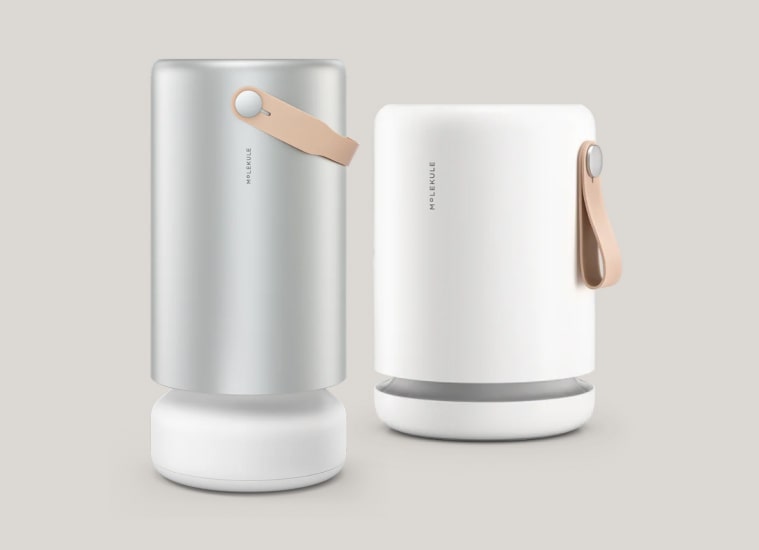How Do Allergies Affect Your Sleep? Tips for Managing Allergies While Sleeping

If you suffer from allergies, you may have noticed how they can disrupt your sleep. Allergic reactions can cause a variety of symptoms, such as nasal congestion, sneezing, coughing, and even asthma attacks—symptoms that make it difficult to get a good night’s rest. Whether it’s seasonal allergies from pollen, pet dander, dust mites, or indoor allergens, these triggers can leave you tossing and turning throughout the night. In this blog post, we’ll explore how allergies can affect your sleep and share effective strategies for managing allergy symptoms so you can sleep better, feel more rested, and wake up refreshed.
How Allergies Affect Sleep
Allergies can interfere with your sleep by causing both physical discomfort and respiratory distress. Here’s how allergies impact sleep quality:
- Nasal Congestion: Nasal congestion is one of the most common symptoms of allergies. When the nasal passages become swollen and blocked due to inflammation, it makes breathing through the nose difficult. As a result, you may find yourself breathing through your mouth, which can dry out your mouth and throat, causing further discomfort during the night.
- Postnasal Drip: Postnasal drip occurs when mucus from the sinuses drips down the back of the throat, irritating. This can lead to coughing, a sore throat, and frequent awakenings throughout the night. It’s a common issue for people with allergic rhinitis (hay fever) and can severely disrupt sleep.
- Asthma and Wheezing: Asthma is often triggered by allergens, especially in people with allergy-induced asthma. When allergens like pollen, pet dander, or dust mites are present in the air, the airways can constrict, making it harder to breathe and causing wheezing and coughing. This can prevent a restful night’s sleep and lead to asthma attacks.
- Skin Irritation: Allergic skin reactions, such as rashes or eczema, can cause discomfort while sleeping. If you have skin allergies, the constant itching can make it hard to fall asleep and stay asleep.
- Inflammation and Restlessness:
Allergies trigger the release of histamines and other chemicals that cause inflammation in the body. This systemic inflammation can make you feel restless or uncomfortable, which can prevent deep, restorative sleep.
Tips for Managing Allergies While Sleeping
If you’re struggling with sleep due to allergies, there are several steps you can take to minimize symptoms and improve your sleep quality:
1. Keep Allergens Out of Your Bedroom
Your bedroom should be a sanctuary, free from allergens that trigger your symptoms. Follow these tips to create an allergy-free sleeping environment:
- Use Allergen-Proof Bedding: Invest in allergen-proof pillowcases, mattress covers, and sheets to prevent dust mites and other allergens from accumulating in your bedding. Wash your bedding weekly in hot water to kill dust mites.
- Keep Pets Out of the Bedroom: If you’re allergic to pet dander, keep pets out of your bedroom to reduce exposure. Pet dander can stick to furniture, clothing, and bedding, so it’s essential to create a pet-free zone while you sleep.
- Clean Regularly: Dust and vacuum regularly with a HEPA filter to remove allergens from surfaces and floors. Use a damp cloth to dust furniture, which helps trap allergens rather than spreading them in the air.
2. Use a Humidifier or Air Purifier
Dry air can aggravate allergies and asthma, making symptoms worse. A humidifier can add moisture to the air, preventing your nasal passages and throat from drying out, which reduces irritation from postnasal drip. Just be sure to clean the humidifier regularly to avoid mold growth.
Air purifiers with HEPA filters are also beneficial in removing airborne allergens, such as pollen, dust mites, and pet dander. Placing an air purifier in your bedroom can help ensure that the air you breathe is free of irritants while you sleep.
3. Take Allergy Medications Before Bed
If you know that your allergies will interfere with your sleep, consider taking your allergy medications before bed. Over-the-counter antihistamines, nasal sprays, or decongestants can help reduce inflammation and alleviate symptoms like congestion, sneezing, and itching.
For people with asthma or allergy-induced asthma, taking prescribed inhalers or using a nebulizer before bed can help prevent symptoms during the night. Be sure to follow your doctor’s advice on how and when to use your medications.
4. Sleep with Your Head Elevated
Elevating your head with an extra pillow or using a wedge pillow can help reduce nasal congestion and postnasal drip. By sleeping with your head raised, you can minimize the chances of mucus draining into your throat, reducing coughing and discomfort during the night.
5. Maintain a Regular Sleep Schedule
Creating a consistent sleep routine can help you fall asleep more easily and get a deeper night’s rest. Go to bed at the same time each night and create a relaxing bedtime routine, such as reading or listening to soothing music, to help signal to your body that it’s time to rest.
Get the Rest You Deserve with Allergy Relief in Oxnard
Managing allergies while trying to get a good night’s sleep can be challenging, but with the right strategies in place, you can reduce your symptoms and sleep better. By creating an allergy-free bedroom, using air purifiers and humidifiers, and taking medications as prescribed, you can significantly improve your sleep quality. If you’re struggling with allergies or asthma and need help managing your symptoms, contact Allergy, Asthma, and Immunology Medical Groupin Oxnard, CA. Our team of experienced allergists is here to help you find personalized solutions for better sleep and overall health. Call us today at 805-658-9500 to schedule an appointment and take the first step toward better sleep and allergy relief.




